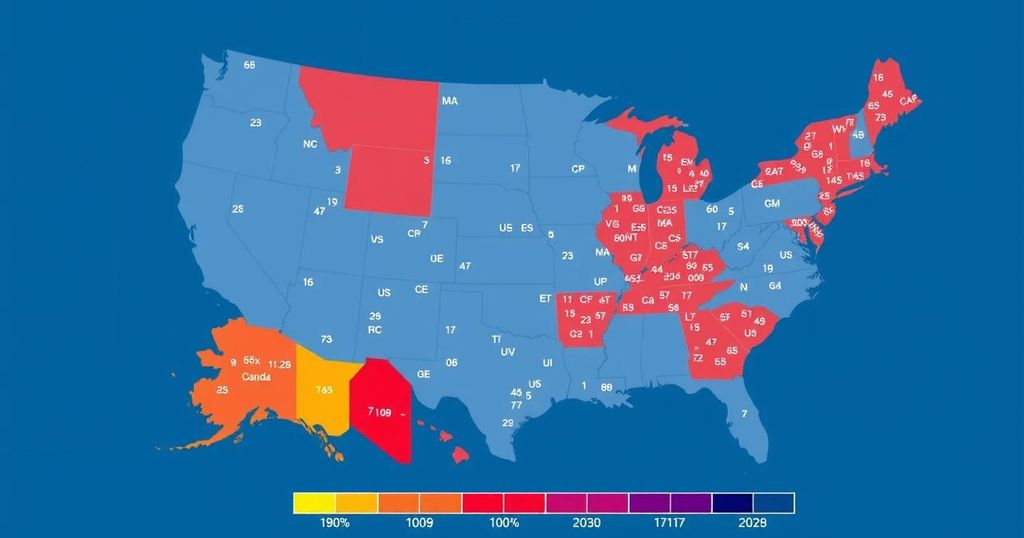The article examines the potential impact of a controversial remark made about Puerto Rico during a Trump rally, which could galvanize Puerto Rican voters against his campaign. It underscores the significance of the Puerto Rican demographic in key swing states and how sentiments expressed could alter election outcomes, particularly with notable endorsements for the Harris-Walz campaign emerging in reaction to the remarks.
As the US election campaign approaches its conclusion, the stakes remain high, with many analysts labeling it a neck-and-neck race. However, a notable controversy during a rally could pose a significant challenge for Donald Trump’s campaign. At a rally held at Madison Square Garden on October 27, 2023, remarks made by comedian Tony Hinchcliffe sparked outrage amongst Puerto Ricans, which could translate into electoral consequences. Hinchcliffe, in his opening speech, referred to Puerto Rico as an “island of garbage,” prompting swift backlash from the Puerto Rican community and their allies across the political spectrum. This incident not only drew condemnation but also galvanized support for the Harris-Walz campaign, raising the prospect of a strong Puerto Rican voter response that may affect the election outcome. Given that the elections hinge on tightly contested swing states, a backlash from the Puerto Rican community could be particularly impactful. Even though Puerto Rico is not a state and lacks electoral votes, Puerto Ricans are US citizens and many reside in key swing states such as Pennsylvania, where they have historically leaned Democratic. The endorsement of the Harris-Walz campaign by prominent Puerto Rican figures like Bad Bunny, Ricky Martin, and Jennifer Lopez could further mobilize this demographic. In summary, the poised electoral outcome in contestable states may indeed be influenced by the Puerto Rican electorate, particularly influenced by recent incendiary remarks which may galvanize their regional turnout. The distribution of Puerto Ricans across swing states is non-trivial. In Pennsylvania alone, a substantial number of Puerto Ricans could sway the electoral vote, given their potential to tip the balance as seen in previous elections. This aligns with strategic moves by the Harris-Walz campaign, which engaged Latino voters in Pennsylvania during the rally in New York, signaling both campaigns’ recognition of this vital demographic. In conclusion, as the election nears, the Puerto Rican community’s reaction to disparaging remarks could be pivotal. With an acutely competitive electoral race, addressing the sentiments of Puerto Rican voters, especially in key states, may be vital for determining the eventual victor.
The article discusses the current state of the US election campaign as it nears its conclusion, focusing on recent events concerning remarks made about Puerto Rico that may affect the election outcome. It outlines the significance of Puerto Rican voters in swing states, highlighting their historical voting tendencies and the potential impact of public sentiment on their electoral participation. The controversy sparked by the remarks made during Donald Trump’s rally in New York is framed as a critical moment that could mobilize the voting community, especially in light of the demographic’s growing prominence. Additionally, it emphasizes the strategic importance of swing states in determining the overall election outcome while recognizing the implications of these events on voting behaviors and endorsements.
The recent remarks made during a rally have the potential to catalyze a significant response from the Puerto Rican community that may influence the tightly contested US elections. Given the historical tendency of Puerto Ricans to support Democratic candidates and their substantial presence in key swing states, this demographic could ultimately prove decisive in shaping the electoral outcome. With prominent figures endorsing the opposition campaign in light of the controversy, the electoral impact hidden within this ‘October surprise’ warrants careful attention from both political parties as they navigate the final days of the campaign.
Original Source: theconversation.com






